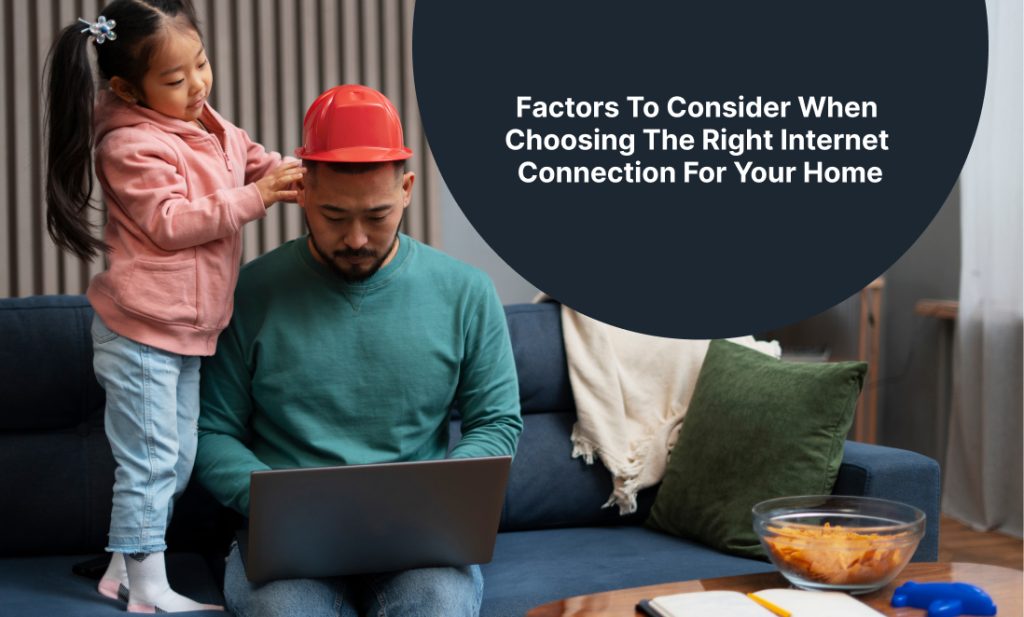

Having a solid internet connection at home is just as important as having a steady supply of electricity and running water. If you need the internet for work at home, to binge-watch your favourite series, or to catch up with loved ones through video calls, the quality of your internet connection can make a big difference in your daily life.
If you live in the UK, the wide range of options available can be pretty overwhelming. But don’t worry—we’re here to help. This guide will walk you through the key factors to consider when choosing the right internet connection for your home so you can make an informed decision and stay connected without any hiccups.
1. What Are Your Internet Needs?
Before getting into the details, it’s important to understand what you actually need from your internet connection. Different households have different requirements, and figuring out yours will help you choose the best option.
Usage

First, think about how you use the internet. Are you a light user, a moderate user, or a heavy user?
Light usage: If you mostly use the internet for browsing the web and checking emails, you won’t need a super-fast connection. A speed of 1–5 Mbps should be sufficient for your needs.
Moderate usage: If your household likes to stream music, watch standard-definition videos, or engage in some online gaming, you’ll need a bit more speed. A connection offering 10–25 Mbps will generally work well.
Heavy usage: For those who stream high-definition or 4K videos, play online games, or have multiple devices connected at once, a faster connection is necessary. Look for plans offering 25 Mbps or higher to ensure a smooth experience.
Number of Devices
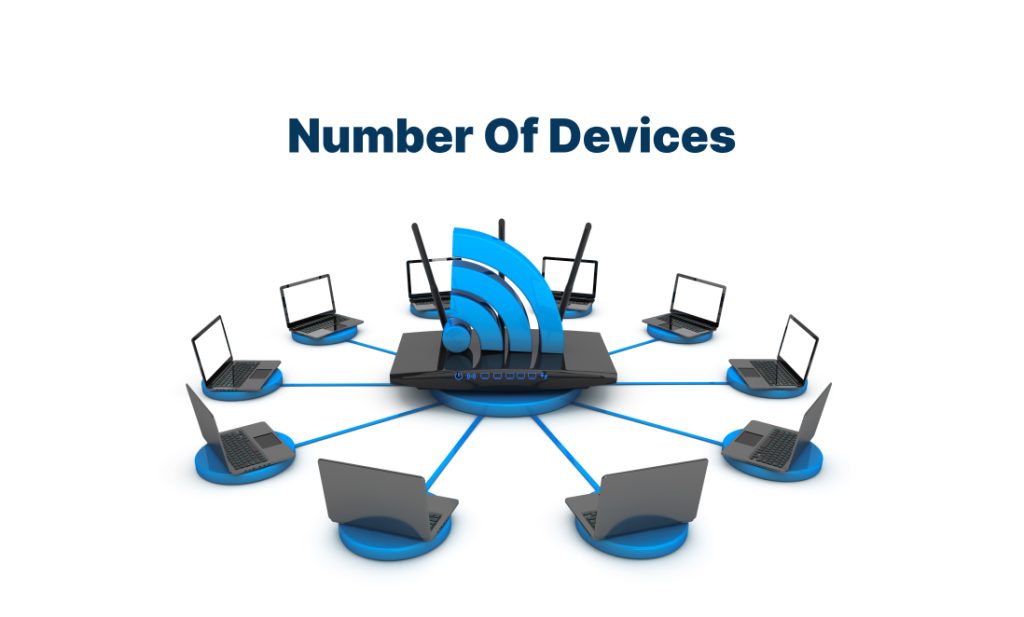
Consider the number of devices that will be connected to your network. In a typical household, you might have smartphones, tablets, laptops, smart TVs, and even smart home devices all competing for bandwidth. The more devices you have, the more speed you will need to keep everything running smoothly without interruptions.
Future-Proofing

It’s also wise to think ahead. Technology is always advancing, and your internet needs might grow over time. If you’re planning to upgrade your home with more smart devices or if you anticipate higher internet usage in the future, it might be worth investing in a faster connection now. This way, you won’t need to switch providers or plans as your needs change.
By taking the time to assess your internet usage, the number of devices in your home, and your future needs, you can make a more informed decision about which type of internet connection will best suit your household.
2. Types of Internet Connections
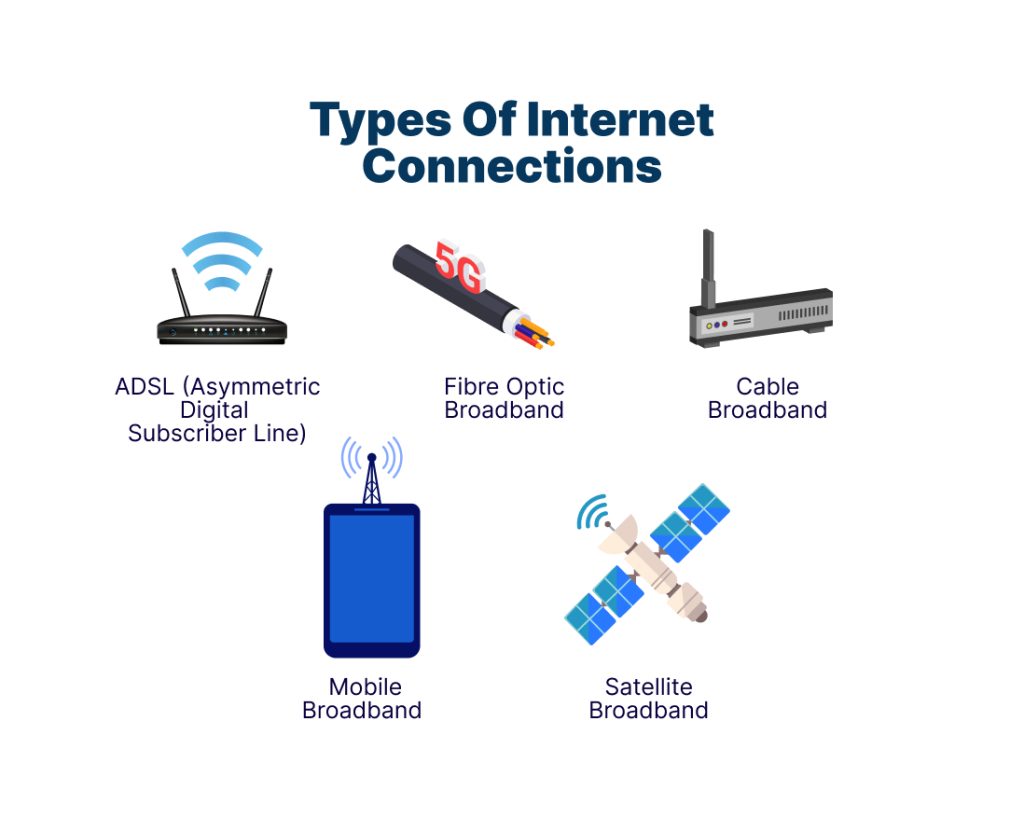
Understanding the different types of internet connections available is necessary for choosing the right one for your home. Each type comes with its own set of pros and cons, so let’s break them down to help you make an informed decision.
ADSL (Asymmetric Digital Subscriber Line)
ADSL is a type of broadband connection that uses existing telephone lines to deliver internet service. It’s one of the more traditional forms of internet and is widely available across the UK.
| Pros | Cons |
| Availability: ADSL is accessible in most areas, including rural regions where other types of broadband might not reach. | Speed: ADSL offers slower speeds compared to newer types of broadband. This can be an issue for households with high data usage. |
| Cost: It’s usually one of the more affordable internet options, making it attractive for households on a budget. | Distance Impact: The speed and reliability of ADSL can reduce significantly the further you are from the telephone exchange. |
Fibre Optic Broadband
Fibre-optic broadband uses fibre-optic cables to deliver high-speed internet. It’s becoming increasingly popular due to its superior speed and reliability.
FTTC (Fibre to the Cabinet): This type of fibre optic broadband involves running fibre cables to a street cabinet and, from there, copper wires to your home. It’s a hybrid solution that’s more widely available than full fibre.
FTTP (Fibre to the Premises): This offers a full-fibre connection directly to your home, providing the fastest and most reliable internet service.
| Pros | Cons |
| Speed: Fibre optic broadband offers significantly higher speeds compared to ADSL, making it ideal for streaming, gaming, and households with multiple devices. | Cost: Fibre optic broadband is generally more expensive than ADSL and other traditional forms of internet. |
| Reliability: Fibre connections are less prone to interference and signal degradation, ensuring a more stable internet experience. | Availability: While expanding, full fibre (FTTP) is still not available in many rural areas. |
Cable Broadband
Cable broadband uses coaxial cables, which are typically the same ones used for cable TV, to provide internet access. It’s known for its fast speeds and stable performance.
| Pros | Cons |
| Speed: Cable broadband can offer speeds comparable to fibre, making it a good choice for high-demand households. | Stability: It provides a stable connection that is less affected by distance compared to ADSL. |
| Availability: Cable broadband might not be as widely available as ADSL or even fibre in some regions, especially rural areas. | Shared Bandwidth: The connection speed can fluctuate based on the number of users in your area, especially during peak times. |
Mobile Broadband
Mobile broadband uses the 4G and 5G mobile networks to provide internet access. This type of connection is highly flexible and can be a great option if you move frequently or need internet on the go.
| Pros | Cons |
| Portability: Mobile broadband can be taken with you wherever you go, as long as there is mobile network coverage. | No Fixed Line Needed: It’s a convenient option if you don’t have a fixed telephone line or don’t want to install one. |
| Data Caps: Mobile broadband plans often come with data caps, which can be limiting if you have high internet usage. | Variable Speed: Speeds can vary depending on your location and network congestion. |
Satellite Broadband
Satellite broadband is delivered via satellites orbiting the Earth, making it available almost anywhere. This can be a lifesaver in remote or rural areas where other broadband types are unavailable.
| Pros | Cons |
| Availability: Satellite broadband can reach areas where other types of internet cannot, ensuring even the most remote locations have access. | High Latency: The time it takes for signals to travel to and from the satellite can result in high latency, which is not ideal for activities like online gaming or video conferencing.Cost: It’s generally more expensive than other types of broadband, both in terms of monthly fees and equipment costs.Weather Dependent: Performance can be affected by weather conditions such as heavy rain or snow. |
Understanding the various types of internet connections available helps you decide which one suits your household’s needs. Whether you opt for ADSL, fibre optic, cable, mobile, or satellite broadband, each has its own advantages and limitations.
3. Speed and Bandwidth of Your Internet Connection
Understanding speed and bandwidth is important when choosing an internet connection. These factors determine how quickly data can be transferred and how smoothly online activities will run.
Here are the things that should concern you:
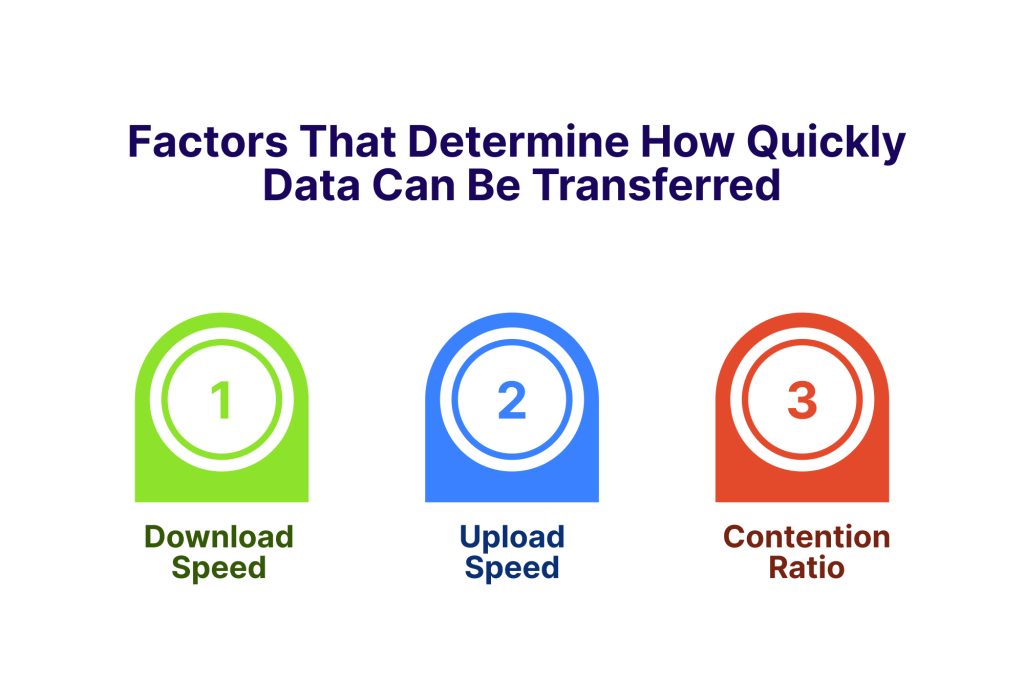
1. Download Speed
Download speed refers to how fast data is transferred from the internet to your devices. This is especially important for activities like streaming videos, browsing the web, and downloading files. Most internet providers advertise their plans based on download speed because it’s what most users prioritise. For instance, if you’re streaming HD videos or gaming online, you’ll need higher download speeds to avoid buffering and lag.
For light users who mainly browse the web and check emails, a 10–20 Mbps download speed should be sufficient. Moderate users who stream videos and participate in video calls might need 20–50 Mbps speeds. Heavy users with multiple devices and high data usage, such as 4K streaming and large file downloads, should look for 100 Mbps or more speeds.
2. Upload Speed
Upload speed is the rate at which data is sent from your device to the internet. This is crucial for activities such as video conferencing, uploading large files to cloud storage, and online gaming. While often overlooked, a good upload speed can make a significant difference if you frequently engage in these activities.
For example, video conferencing on platforms like Zoom or Teams requires a decent upload speed to ensure a smooth and clear video feed. A higher upload speed is beneficial if you often upload videos to platforms like YouTube or work with large files in cloud-based services. Generally, upload speeds are lower than download speeds in most internet plans, but some providers offer plans with higher upload speeds specifically for users who need them.
3. Contention Ratio
Contention ratio refers to the number of households sharing the same internet connection bandwidth. It essentially indicates how much competition there is for the available bandwidth at any given time. A lower contention ratio means fewer users are sharing the connection, which generally results in better performance, especially during peak times.
For instance, a contention ratio of 20:1 means that up to 20 households share the same bandwidth. If most of those households are online simultaneously, you might experience slower speeds. On the other hand, a lower ratio, such as 10:1, would likely provide more consistent speeds regardless of peak usage times.
Understanding these aspects of speed and bandwidth helps ensure you choose an internet plan that fits your household’s needs, providing a smoother and more reliable online experience.
4. Data Caps and Fair Usage Policies
When choosing an internet connection, it’s important to understand the terms and conditions related to data usage, especially data caps and fair usage policies.
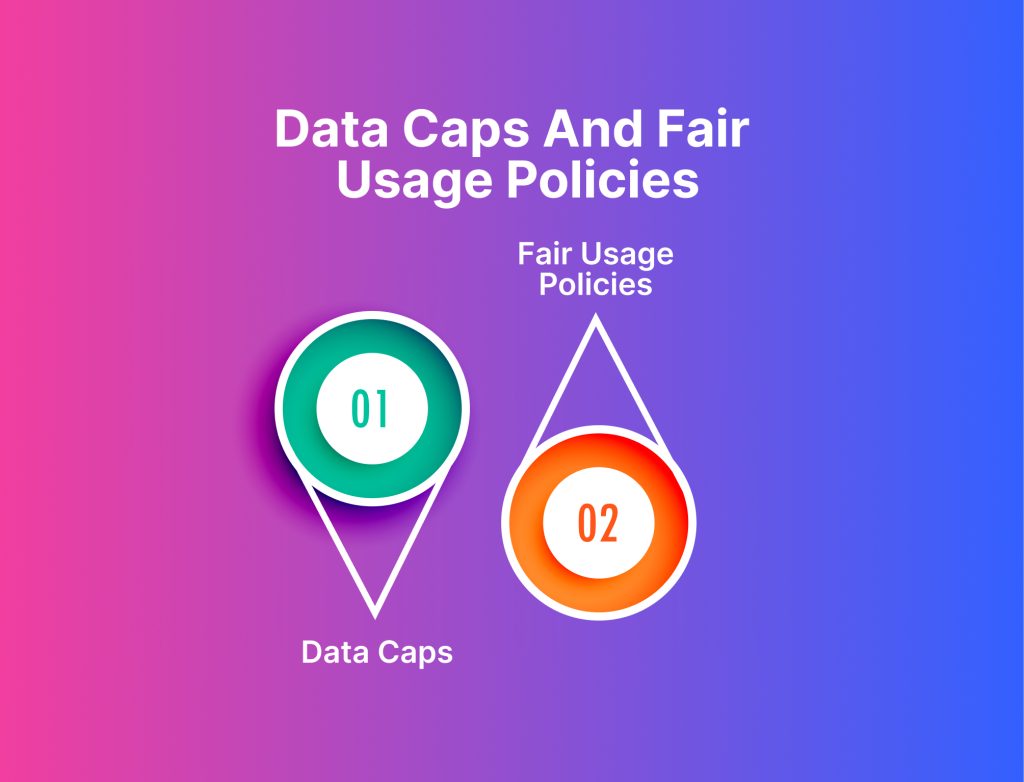
Data Caps
Data caps are limits set by your internet service provider (ISP) on the amount of data you can use each month. Once you exceed this limit, you might face additional charges, reduced speeds, or even temporary suspension of your service. Data caps can vary significantly between providers and plans. Some providers offer unlimited data plans, which can be beneficial for households with high internet usage, such as streaming HD or 4K videos, online gaming, or multiple devices connected simultaneously.
For example, a plan with a 100GB data cap might be sufficient for light users who primarily browse the web and check emails. However, if your household streams a lot of video content or has multiple users, you might quickly exceed this limit. In such cases, opting for an unlimited data plan or a plan with a higher data cap would be more suitable to avoid additional charges or throttling.
Fair Usage Policies
Fair usage policies are implemented by ISPs to ensure a fair distribution of network resources among all users. Even if a plan is advertised as “unlimited,” there might be clauses that allow the provider to reduce your speed if you use an excessive amount of data, especially during peak times. This is done to prevent a small number of heavy users from negatively impacting the service quality for others.
For instance, if you’re on an unlimited plan but consistently use an unusually high amount of data, your ISP might throttle your connection speed during peak hours to manage network traffic. To avoid unexpected slowdowns, it’s important to read the fine print and understand how your provider defines and enforces fair usage.
5. Contract Length and Flexibility
When selecting an internet service provider (ISP), it’s essential to consider the contract length and the flexibility it offers. Here’s what you need to know about contract terms and potential cancellation fees:
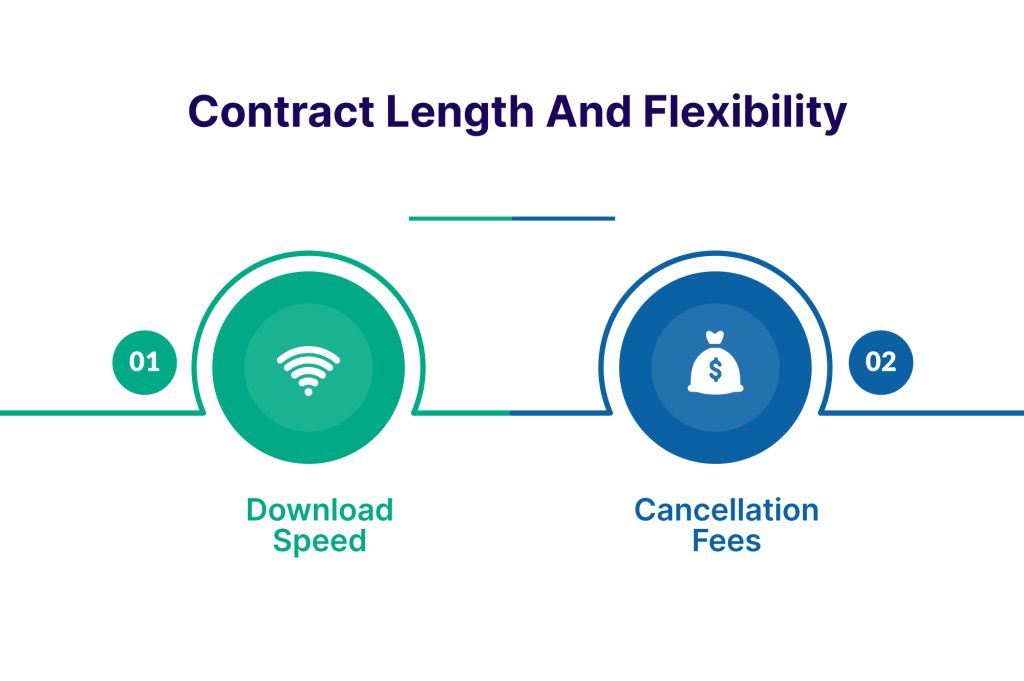
Contract Length
Internet service contracts typically range from 12 to 24 months, although some providers may offer shorter or longer terms. Longer contracts often come with lower monthly rates or introductory discounts, making them appealing to those seeking cost savings. However, committing to a lengthy contract may limit your flexibility if your needs change during the contract period.
For example, if you’re moving to a new location or upgrading to a different type of internet service, a shorter contract or a provider offering month-to-month options might be more suitable. Shorter contracts provide greater flexibility but may come with slightly higher monthly fees.
Cancellation Fees
Before signing a contract, it’s important to understand the provider’s cancellation policy and any associated fees. Most ISPs charge cancellation fees if you terminate your contract before the agreed-upon term expires. These fees can vary widely depending on the provider and the remaining duration of your contract.
For instance, if you need to cancel your service due to relocation or dissatisfaction with the service, you may incur a fee ranging from £50 to £200 or more, depending on the provider. Some ISPs also prorate cancellation fees based on the remaining months of the contract, while others charge a flat fee regardless of the remaining term.
Before committing to a contract, carefully review the terms and conditions regarding cancellation fees and assess the potential costs and implications of early termination. Opting for a provider with more flexible contract terms or no-contract options may offer greater peace of mind and flexibility to adapt to changing circumstances without incurring substantial penalties.
6. Internet Connection Costs
Cost is a significant factor when choosing an internet connection, and it’s essential to consider both the upfront and ongoing expenses associated with your chosen plan. Here’s what you need to know about comparing costs and avoiding hidden fees:
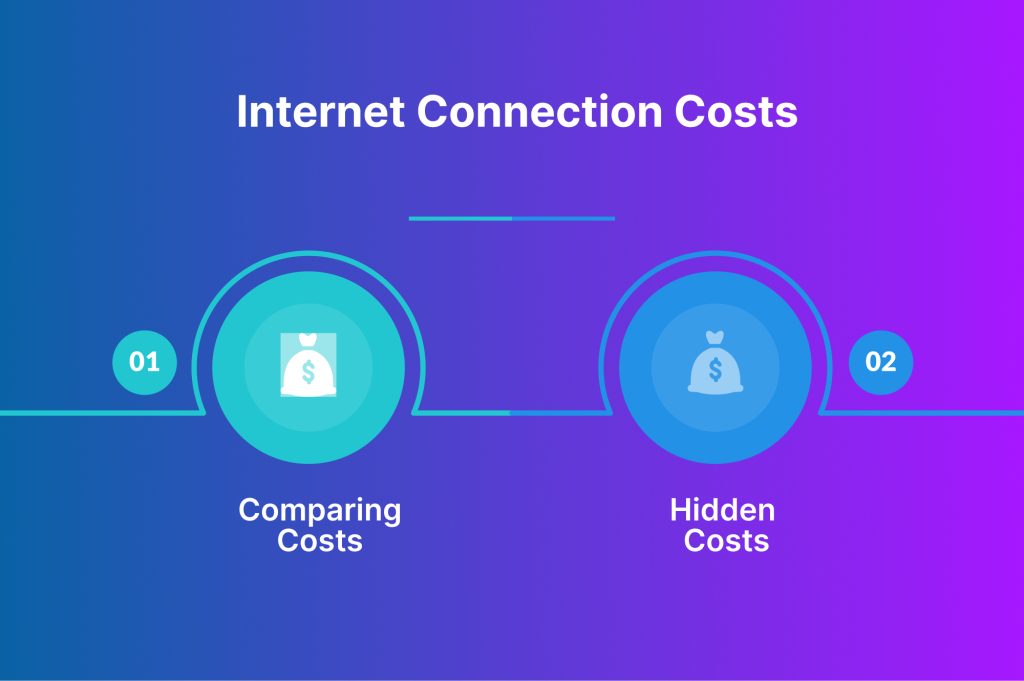
1. Comparing Costs
When comparing internet plans, it’s not just about the monthly subscription fee. You should also consider additional costs such as installation fees, equipment charges, and any promotional offers or discounts.
Monthly Subscription: Start by comparing the monthly subscription fees for different plans offered by various providers. Keep in mind that higher-priced plans may offer faster speeds, unlimited data, or additional perks.
Installation Fees: Some ISPs may charge a one-time installation fee to set up your internet connection. Be sure to inquire about any installation costs upfront to avoid surprises on your first bill.
Equipment Charges: Many ISPs provide a modem or router as part of the service, but some may charge a rental fee for this equipment. If you prefer to use your own equipment, check if the provider offers a BYO (bring your own) option or if there are any additional fees for using third-party equipment.
Promotional Offers: Look for promotional offers, discounts, or bundle deals that can help you save money on your internet service. These offers may include free installation, discounted rates for the first few months, or bundled services such as TV or phone.
2. Hidden Costs
In addition to the obvious expenses, there may be hidden costs associated with your internet plan that you should be aware of:
Early Termination Fees: Some providers impose early termination fees if you cancel your contract before the agreed-upon term expires. These fees can be substantial and should be considered before signing a long-term contract.
Additional Charges: Be mindful of any additional charges that may apply, such as late payment fees, service upgrade fees, or data overage charges. Review the provider’s terms and conditions carefully to understand all potential costs associated with your plan.
Price Increases: While your initial monthly rate may be attractive, some ISPs reserve the right to increase prices after an introductory period. Make sure to inquire about any potential price hikes and how they may impact your monthly expenses in the long run.
Comparing costs and understanding potential hidden fees helps you make more informed decisions when selecting an internet plan that fits your budget and needs. Be sure to factor in all expenses associated with the plan to avoid any unpleasant surprises down the line.
7. Choosing the Right Provider for Your Internet Connection
When it comes to selecting the right internet provider, there are several steps you can take to ensure you make the best decision for your household:
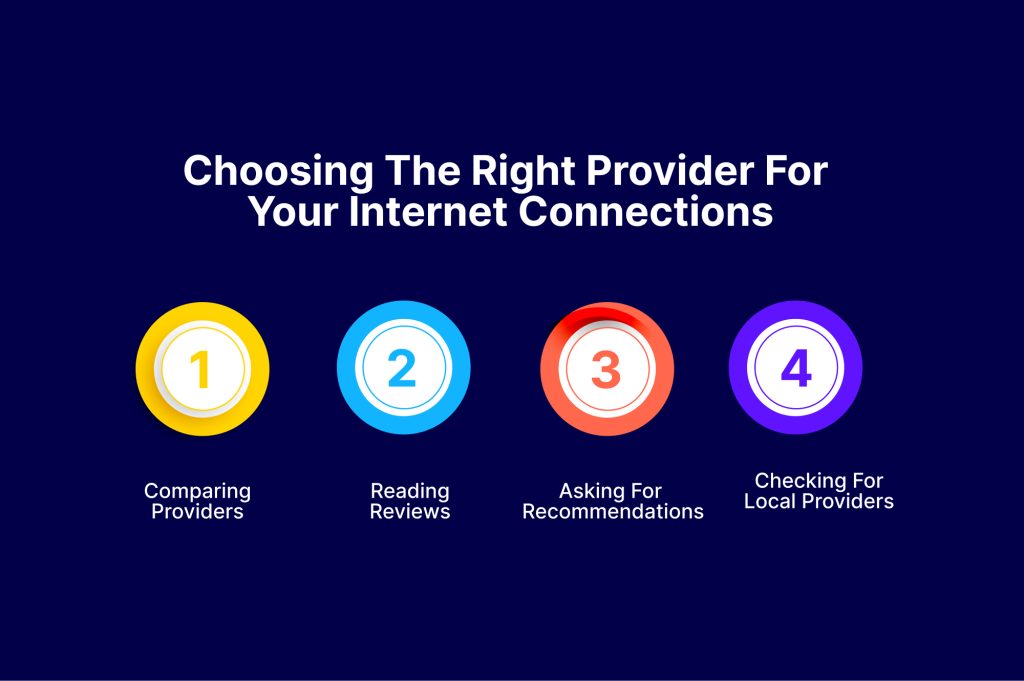
1. Comparing Providers
Start by researching and comparing different internet providers available in your area. Consider factors such as the types of internet connections they offer, their pricing plans, and any additional services or features included. Comparison websites can be valuable tools for evaluating providers side by side and identifying the best options for your needs.
2. Reading Reviews
Reading customer reviews and testimonials can provide valuable insights into each provider’s quality of service and customer satisfaction levels. Look for reviews on independent websites and forums to get a balanced perspective from real users. Pay attention to common themes and recurring issues mentioned in reviews to help gauge each provider’s reliability and performance.
3. Asking for Recommendations
Seeking recommendations from friends, family, or neighbours who have firsthand experience with different internet providers can be invaluable. Ask about their overall satisfaction with the service, any issues they’ve encountered, and how responsive the provider’s customer support is to resolving problems. Personal recommendations can help narrow down your choices and steer you towards reputable providers.
4. Checking for Local Providers
Don’t overlook smaller, local internet providers that may offer competitive pricing and personalised customer service. Local providers often have a vested interest in serving their community and may offer unique benefits or perks not available from larger companies. Use online directories or community forums to identify local providers in your area and inquire about their services.
Comparing providers, reading reviews, seeking recommendations, and exploring local options can help you make a more informed decision when choosing the right internet provider for your home.
Taking the time to research and evaluate your options will help ensure you find a reliable and affordable internet service that meets your needs and expectations.
Final Thoughts
Choosing the right internet connection for your home can significantly impact your daily life. You can make an informed decision that meets your household’s requirements by considering factors such as your usage needs, available options, and provider reliability.
Recapping the key points discussed in this guide, it’s important to assess your internet usage, the number of devices in your household, and your future needs. Understanding the different types of internet connections, their pros and cons, and their availability in your area will help you narrow down your options.
Making an informed decision ensures you select a reliable and cost-effective internet plan that aligns with your needs and budget. Whether you opt for ADSL, fibre optic, cable, mobile, or satellite broadband, prioritising reliability, speed, and customer support will contribute to a positive online experience.
Docalla provides the best broadband deals and connectivity to enjoy seamless internet and make the most of your online activities.